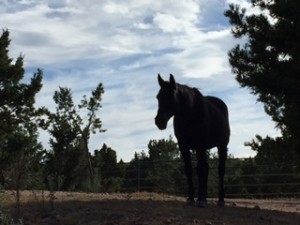 Horse health is such a broad topic, it cannot be limited to what we do in terms of providing hands-on bodywork, or diet or exercise. It also includes emotional, psychological and psychic health, activities to create communication and increase curiosity and the way we ride.
Horse health is such a broad topic, it cannot be limited to what we do in terms of providing hands-on bodywork, or diet or exercise. It also includes emotional, psychological and psychic health, activities to create communication and increase curiosity and the way we ride.
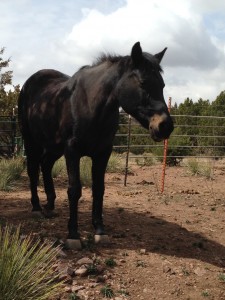 In February, I conducted a Q&A session where one of the questions was about a horse who had stopped eating, and discussing what to do to get the horse eating again. The practitioner with the issue said the horse had just lost his owner and regular stablemates due to death. He had been moved to a new barn with new horses and people.
In February, I conducted a Q&A session where one of the questions was about a horse who had stopped eating, and discussing what to do to get the horse eating again. The practitioner with the issue said the horse had just lost his owner and regular stablemates due to death. He had been moved to a new barn with new horses and people.
We were dealing with more than simple refusal to eat, though that can become complex in itself. We were dealing with a grief process. The answer to the question – what to do about a horse who stopped eating – took on another dimension, as the horse would need more emotional and psychic support in addition to basic dietary needs and bodywork to get the gut functioning properly.
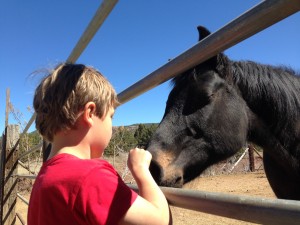 The horse needed a bridge to his new life, where there are very good things available. He just can’t reach for them right now. A horse in this state can go unnoticed in traditional circumstances where people will focus on the lack of appetite but not think about or know how to address the grief.
The horse needed a bridge to his new life, where there are very good things available. He just can’t reach for them right now. A horse in this state can go unnoticed in traditional circumstances where people will focus on the lack of appetite but not think about or know how to address the grief.
What does this horse need? I ask myself. He may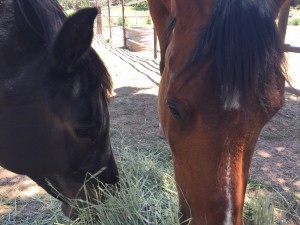 shun connection, though bodywork, a simple laying on of hands, could be very helpful and give valuable information too. Grief makes the body tight and dry, flaky, unresponsive. To loosen up those areas – particularly around the heart – would help the horse feel better in himself, and lo and behold, he may eat.
shun connection, though bodywork, a simple laying on of hands, could be very helpful and give valuable information too. Grief makes the body tight and dry, flaky, unresponsive. To loosen up those areas – particularly around the heart – would help the horse feel better in himself, and lo and behold, he may eat.
Time spent just being with the horse can be invaluable. Maybe he can’t think of anything he wants to do, but you can do things for him. Show him things, talk to him, walk with him.
When we as humans are going through a grieving process, it’s sometimes hard to put one foot in front of the other. It’s hard to talk to others. Imagine what that’s like for the horse. He doesn’t even have the distractions of bills that need paying or job concerns. If he has been left alone with no companions, it can be even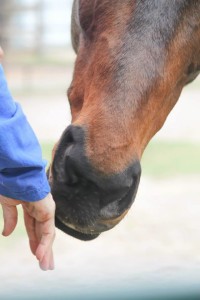 more devastating.
more devastating.
It’s really up to us to set the tone as the horse is not very resourced at this time. If the owner is also grieving, he or she can be honest about the sadness felt, but be careful to remain soft and in memory mode of the lost loved one.
Just being, one of the hardest things for us to do, is probably the best thing you can do. Some horses really enjoy you talking to them, keeping up a conversation, perhaps recounting stories about the departed ones, if you knew the family. Some just want you there, grooming, taking care and talking about their specialness perhaps, bring them back into their bodies. Setting up situations to engage a horse’s curiosity, providing comfort, will all help that horse come around. Walks together are immensely helpful, especially if there are other animals in the neighborhood to visit.
Think in terms of what we all are as mammals – gut, brain, heart, and not necessarily in that order. There are more nerve cells in the gut than anywhere other than the brain. The nerve cells of the gut are part of the enteric nervous system, a separate nervous system that sends messages to the brain. It plays an important role in the emotional health in all of us.
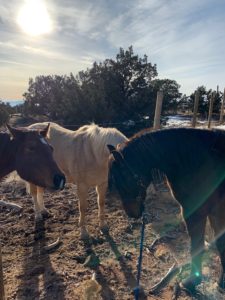 Make sure the horse has companions. Not all horses grieve the same way. Some are sad but they are more able to go through their days as they have a more developed understanding of their stablemate or owners’ passing. That understanding can be supportive to the grieving horse.
Make sure the horse has companions. Not all horses grieve the same way. Some are sad but they are more able to go through their days as they have a more developed understanding of their stablemate or owners’ passing. That understanding can be supportive to the grieving horse.
This is why we look further than digestion and learn the rest of the story, or as much as we can. Sometimes the horse not eating can be a simple dietary change and sometimes it requires more research. Your ability to just be and bring out the presence in the horse will be key.
We are accustomed to extending condolences to bereaved human families. Grief is part of life, not a postscript, tacked on as “oh by the way, this person or horse lost his family.” It is the beginning, the jumping off place, for all else to happen going forward. It may feel that nothing is happening or changing for awhile, but gradually it will.


